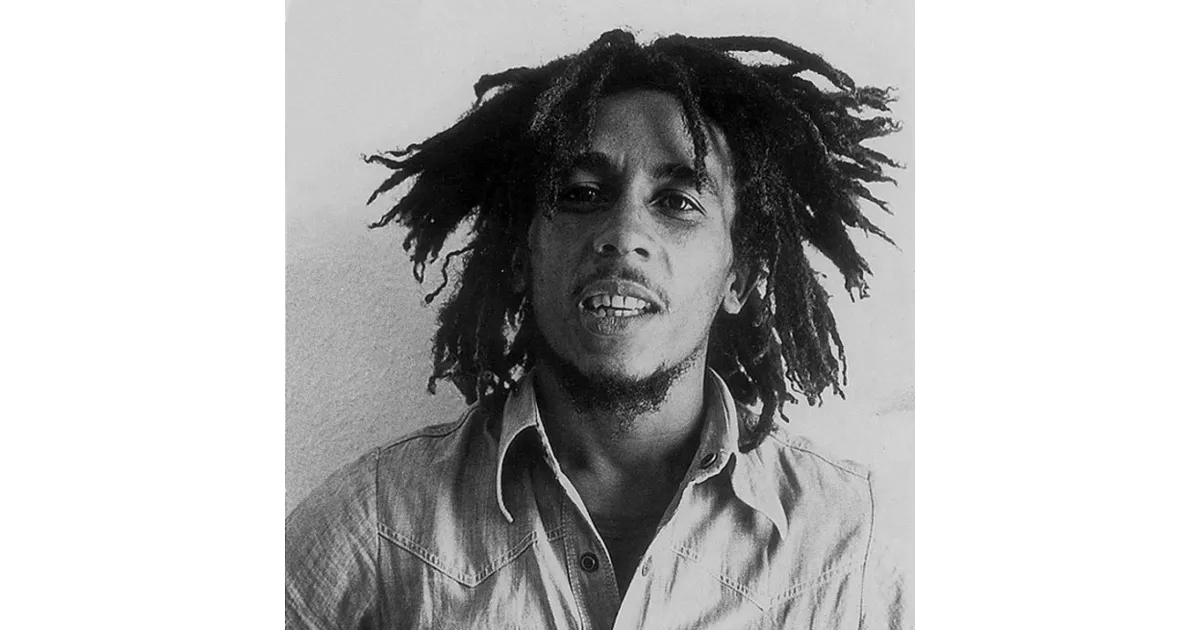Bob Marley was a highly influential Jamaican singer-songwriter and guitarist, pivotal in popularizing reggae music globally. His unique blend of reggae, ska, and rocksteady, coupled with his distinctive vocal style, garnered him international acclaim. Beyond music, Marley became a symbol of Jamaican identity and Rastafarian spirituality, weaving themes of social justice, Pan-Africanism, and cannabis legalization into his work. His outspoken advocacy for democratic reforms and cultural pride made him both revered and controversial, solidifying his legacy as a cultural icon and influential voice for marginalized communities.
1937: Marcus Garvey's speech
In 1937, Marcus Garvey gave a speech in Nova Scotia, which later influenced Bob Marley's "Redemption Song."
February 1945: Bob Marley's Birth
In February 1945, Robert Nesta Marley was born. He would become a Jamaican singer, songwriter, and guitarist, and a pioneer of reggae music.
February 1962: First Recordings
In February 1962, Bob Marley recorded four songs including "One Cup of Coffee" which was released under the pseudonym Bobby Martell, for local music producer Leslie Kong.
1963: Formation of The Teenagers
In 1963, Bob Marley began his career by forming the group Teenagers with Peter Tosh and Bunny Wailer, later known as the Wailers.
February 1964: "Simmer Down" Reached Jamaican No. 1
In February 1964, The Wailers' single "Simmer Down" reached the No. 1 spot in Jamaica, selling an estimated 70,000 copies.
1965: Release of Debut Album
In 1965, The Wailers released their debut studio album, 'The Wailing Wailers,' which included the popular single 'One Love,' establishing them as a rising reggae group.
February 1966: Marriage to Rita Anderson
In February 1966, Bob Marley married Alfarita Constantia "Rita" Anderson in Kingston, Jamaica.
1966: Departure of Members from The Wailers
By 1966, Braithwaite, Kelso, and Smith had left the Wailers, leaving the core trio of Bob Marley, Bunny Wailer, and Peter Tosh.
1966: Conversion to Rastafari and cannabis use
In 1966, Bob Marley converted to the Rastafari faith from Catholicism and began using cannabis.
1966: Marriage and Relocation to Delaware
In 1966, Bob Marley married Rita Anderson and moved to Wilmington, Delaware, working at DuPont and Chrysler under the alias Donald Marley.
1968: Recutting Old Tracks
Between 1968 and 1972, Bob and Rita Marley, Peter Tosh and Bunny Wailer re-cut some old tracks with JAD Records in Kingston and London in an attempt to commercialise the Wailers' sound.
1968: Arrest for cannabis possession
In 1968, Bob Marley was arrested after being caught with cannabis but continued to use marijuana in accordance with his religious beliefs.
1969: Shift to Reggae Sound
In 1969, Bob Marley approached producer Leslie Kong and began incorporating a slower, reggae beat into his music with the Wailers.
1971: Release of 'The Best of The Wailers'
In 1971, The Wailers released the album 'The Best of The Wailers', marking their musical shift after Marley relocated to London.
1972: Living in London
During 1972, Bob Marley lived in Ridgmount Gardens, Bloomsbury, London.
1972: Signing with CBS Records and Meeting Chris Blackwell
In 1972, Bob Marley signed with CBS Records in London, toured with Johnny Nash, and met Chris Blackwell of Island Records, leading to a record deal.
April 1973: Release of 'Catch a Fire'
In April 1973, The Wailers' first album for Island, 'Catch a Fire,' was released worldwide, receiving positive reviews.
1973: International Attention
In 1973, Bob Marley and the Wailers began to gain international attention after signing to Island and touring in support of the albums Catch a Fire and Burnin.
September 1974: Eric Clapton's "I Shot the Sheriff" Reaches No. 1
On September 14, 1974, Eric Clapton's cover of Bob Marley's "I Shot the Sheriff" reached number 1 on the Billboard Hot 100.
1974: Disbandment of The Wailers
In 1974, The Wailers disbanded, with each of the three main members pursuing a solo career.
1974: Solo Career
In 1974, following the disbandment of The Wailers, Bob Marley carried on under the band's name and released the album Natty Dread, which received positive reviews.
1975: International Breakthrough
In 1975, Bob Marley had his international breakthrough with his first hit outside Jamaica with a live version of "No Woman, No Cry", from the Live! album.
December 1976: Assassination Attempt
In December 1976, Bob Marley, Rita, and manager Don Taylor were wounded in an assault by unknown gunmen inside Marley's home, two days before the Smile Jamaica concert.
1976: US Breakthrough and Assassination Attempt
In 1976, Bob Marley achieved his breakthrough album in the United States, Rastaman Vibration, and survived an assassination attempt at his home in Jamaica.
1976: US Breakthrough
In 1976, Bob Marley had his breakthrough album in the United States, Rastaman Vibration, which reached the Top 50 of the Billboard Soul Charts.
1976: Release of "War"
In 1976, Bob Marley released his song "War", which showed his strong opposition to South African apartheid.
June 1977: Rainbow Theatre Concerts
From June 1-4, 1977, Bob Marley played with the Wailers at the Rainbow Theatre in London, with highlights recorded in the BBC documentary Bob Marley: Live at the Rainbow 1977.
July 1977: Diagnosis of Malignant Melanoma
In July 1977, Bob Marley was diagnosed with malignant melanoma under the nail of his right big toe.
1977: Diagnosis of Melanoma
In 1977, Bob Marley was diagnosed with acral lentiginous melanoma.
1978: Release of "Babylon by Bus"
In 1978, Bob Marley and the Wailers released "Babylon by Bus", a double live album featuring 13 tracks, which received critical acclaim and captured the intensity of Marley's live performances.
1978: Support for Tottenham Hotspur
In 1978, Bob Marley followed English football club Tottenham Hotspur, and Argentine midfielder Ossie Ardiles.
1978: Return to Jamaica and One Love Peace Concert
In 1978, Bob Marley returned to Jamaica and performed at the One Love Peace Concert, uniting political rivals Michael Manley and Edward Seaga on stage.
July 1979: Appearance at the Amandla Festival
In July 1979, Bob Marley appeared at the Amandla Festival in Boston, demonstrating his opposition to South African apartheid.
May 1980: Release of Uprising album
In May 1980, the album Uprising was released by Bob Marley and the Wailers.
July 1980: Last outdoor concert in Dublin
On 6 July 1980, Bob Marley played his last ever outdoor concert at Dalymount Park in Dublin.
September 1980: Collapse in Central Park and final concert
In September 1980, Bob Marley collapsed while jogging in Central Park and was hospitalized. His last concert took place on 23 September 1980, at the Stanley Theater in Pittsburgh.
November 1980: Baptism into Ethiopian Orthodox Christianity
In November 1980, shortly before his death, Bob Marley converted to Ethiopian Orthodox Christianity and was baptised with the name Berhane Selassie.
1980: Scheduling a world tour
Despite his illness, in 1980, Bob Marley was in the process of scheduling a world tour.
1980: Release of Uprising
In 1980, Uprising was released. It was Bob Marley's final studio album and included "Redemption Song" and "Forever Loving Jah".
1980: Performance at Zimbabwe's Independence Day Celebration
In early 1980, Bob Marley was invited to perform at the 17 April celebration of Zimbabwe's Independence Day.
May 1981: Death
In May 1981, Bob Marley died shortly after baptism into the Ethiopian Orthodox Church, leading to widespread grief and a state funeral in Jamaica.
May 1981: Bob Marley's Death
In May 1981, Bob Marley, the iconic Jamaican singer, songwriter, and guitarist, passed away. He left behind a significant legacy as one of the pioneers of reggae music.
May 1981: Death of Bob Marley
On 11 May 1981, Bob Marley died at the age of 36 due to the spread of melanoma to his lungs and brain.
May 1981: State Funeral in Jamaica
On 21 May 1981, Bob Marley was given a state funeral in Jamaica, combining Ethiopian Orthodoxy and Rastafari traditions, and was buried near his birthplace.
1983: Posthumous Release of Confrontation
In 1983, Confrontation was released posthumously, containing unreleased material recorded during Bob Marley's lifetime.
1984: Release of 'Legend'
In 1984, the greatest hits album 'Legend' was released, becoming the best-selling reggae album of all time.
1994: Posthumous Induction into the Rock and Roll Hall of Fame
In 1994, Bob Marley was posthumously inducted into the Rock and Roll Hall of Fame, solidifying his legacy.
2006: "Bob Marley Boulevard" Co-naming
In 2006, a portion of Church Avenue in Brooklyn was co-named "Bob Marley Boulevard" by the New York City Department of Education.
2007: Reference in "I Am Legend"
In 2007, Bob Marley is discussed in the action thriller "I Am Legend", where the protagonist named his daughter after him.
February 2008: Scorsese announces Marley documentary
In February 2008, Martin Scorsese announced his intention to produce a documentary movie on Bob Marley.
2008: Inauguration of Marley statue in Serbia
In 2008, a statue of Bob Marley was inaugurated in Banatski Sokolac, Serbia.
February 2010: Intended release date of Scorsese's documentary
February 6, 2010, was the intended release date for Martin Scorsese's documentary on Bob Marley.
2011: Premiere of "Bob Marley: The Making of a Legend"
In 2011, the documentary "Bob Marley: The Making of a Legend" premiered at the Edinburgh International Film Festival.
April 2012: Release of "Marley" documentary
On 20 April 2012, the documentary "Marley", directed by Kevin Macdonald, was released.
2012: Inclusion of Concert Photographs in "Marley" Documentary
In 2012, photographs from Bob Marley's last concert were included in Kevin Macdonald's documentary film Marley.
October 2015: Man Booker Prize
In October 2015, Marlon James's novel, A Brief History of Seven Killings, a fictional account of the attempted assassination of Marley, won the 2015 Man Booker Prize.
February 2020: Announcement of "Get Up, Stand Up! The Bob Marley Musical"
In February 2020, "Get Up, Stand Up! The Bob Marley Musical" was announced by writer Lee Hall and director Dominic Cooke.
October 2021: Premiere of "Get Up, Stand Up! The Bob Marley Musical"
On 20 October 2021, "Get Up, Stand Up! The Bob Marley Musical" premiered at London's Lyric Theatre.
February 2024: Release of "Bob Marley: One Love"
In February 2024, Bob Marley: One Love, a biographical drama musical film, was released in the United States.
Mentioned in this timeline
CBS Broadcasting Inc CBS is a prominent American commercial broadcast...

The Billboard Hot is the primary music chart in the...
Nova Scotia is a province in the Maritimes region of...

Football is a family of team sports primarily involving kicking...

The Rock and Roll Hall of Fame located in Cleveland...
Jamaica is an island country located in the Caribbean south...
Trending

12 minutes ago Strickland vs. Hernandez clash at UFC Houston: Preview and Hernandez's strong response.

1 hour ago Gordon Ramsay's New Netflix Series, Childhood, and Restaurant Ventures Explored.

4 months ago Sebastian Korda faces Lorenzo Sonego in the Paris Masters 2025 Round-of-64.

2 hours ago Luke Hughes makes a surprise return to New Jersey Devils practice after Olympic break.
2 hours ago Slovakia's Olympic Hockey Magic Continues: Medal Game After Defeating Germany

2 hours ago Cerundolo Dominates Navone, Advances in Rio Open 2026; Match vs Tirante Predicted
Popular

Jesse Jackson is an American civil rights activist politician and...
Randall Adam Fine is an American politician a Republican who...

Pam Bondi is an American attorney lobbyist and politician currently...

Barack Obama the th U S President - was the...

Kid Rock born Robert James Ritchie is an American musician...

Martin Luther King Jr was a pivotal leader in the...
